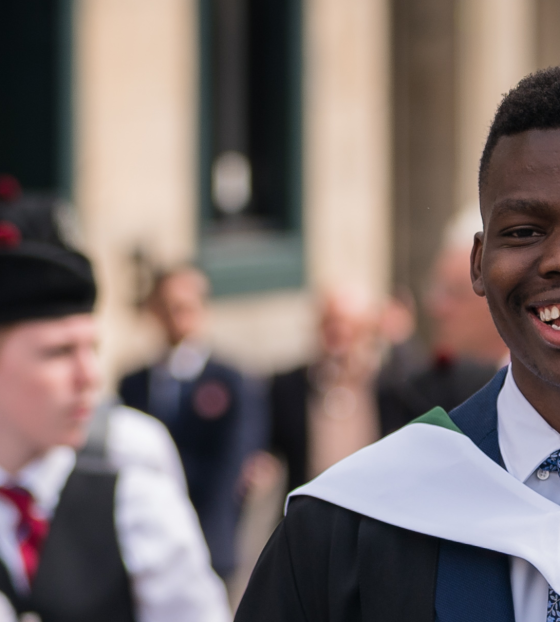
Gift’s story – a catalyst for change in Malawi
Daily school meals can have a transformative effect on children living in poverty – helping them to grow, their families to thrive and enabling their communities to break the cycle of poverty they live in.
The promise of daily school meals served at schools in some of the world’s poorest countries encourages vulnerable children to go to school, increases their ability to participate and gives them the opportunity to receive an education.
But the impact of Mary’s Meals’ school feeding program goes far beyond reducing a child’s immediate hunger and improving their educational outcomes – it is often a catalyst for much deeper, more profound change that gives children hope, and helps their families and communities to break the cycle of poverty they live in.
In this article, we hear from Gift, a young man from Malawi who received Mary’s Meals at primary school, went on to study at university and now heads up a team that helps people living without electricity to harness solar energy.
The opportunity for an education
Gift began receiving Mary’s Meals at primary school in Malawi when he was eight years old. Before that, hunger caused him to lack motivation to go to school and learn:
“I was raised by a single mother,” he says. “Sometimes she would have to go to work or to look for food and knowing that she wasn’t at home affected my attendance. If my mother wasn’t there it was difficult for her to control whether or not I went to school. I was so demotivated and hungry – sometimes I just wanted to hang around [at home] as maybe the neighbours would give me something [to eat].”
“When I started to eat Mary’s Meals, I would know that if I go to school, I will have something to eat. Even on the days when I didn’t want to go, the promise of Mary’s Meals inspired me to attend classes, and it really helped me to focus at school. In Malawi, you have kids who are dropping out of school because they’re hungry, so just knowing that this wasn’t an issue for me inspired me to go to school.”
Unlocking potential
After finishing primary school. Gift went to secondary school, and while he was there, he lived at STEKA – a home for vulnerable children in Blantyre. It was there he met Emma Wood and her daughter, from Scotland, who were supporters of STEKA.
“My daughter worked at STEKA as a volunteer and got to know the young people very well,” says Emma. “She knew that Gift was doing well at school and dreamed of studying sociology so that he could learn more about the barriers to social change in Malawi, and how he could make a difference.”
“By that time, we had set up a charity, based at the university, to support STEKA to build a vocational skills training centre outside Blantyre. Gift came to live with our family while he was at university.”

And the rest is history. He gained a 2.1 in Public Sociology and went on to earn a distinction in an MSc in International Management and Leadership. After graduating from university in Scotland, Gift returned to Malawi to intern at a social enterprise that supports entrepreneurs in the local area to start new businesses. He now heads up a team helping people living without electricity to light their homes with solar power.
A catalyst for change
The ending is not yet written for the children we serve or those still waiting. In areas of great need across the countries where we work, our school feeding programme is more crucial than ever before.
“The impact of Mary’s Meals has been life changing,” says Gift. “If I didn’t have Mary’s Meals, maybe I would have dropped out [of school]. I have completed education and been able to go to university – I think it’s something that has changed my life.”
“I would like a job with an international NGO,” he says. “As I feel that I have a unique insight into the lived experience of people suffering from poverty in Malawi. I believe that it's very important that everybody's voices are heard, and my life experience and my education has given me the skills and insights I need to do that.”